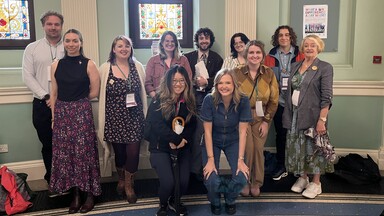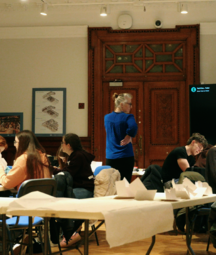Attendees included educators, content creators, and representatives from organisations such as Conradh na Gaeilge,Tuarisc.ie, GaelGoer,ADAPT’s eSTÓR project, Raidió na Life, Raidió Rí-Rá, along with Irish language content creators. The workshop explored how digital tools can support the use and growth of the Irish language online.
About Rising Voices and the UNESCO Digital Activism Toolkit
Rising Voices is a Global Voices initiative supporting minority language communities to share their stories through digital media. With nearly half of the world’s spoken languages at risk of extinction by 2100, projects like this are vital. Irish, for example, is listed as “definitely endangered” by UNESCO and faces the threat of extinction.
To address this, Rising Voices collaborated with UNESCO and other partners to create the Digital Initiatives for Minority Languages Toolkit for the International Decade of Indigenous Languages (2022–2032). This toolkit outlines how the internet and digital tools can be leveraged to conserve and promote Indigenous languages, and it formed the basis for the workshop.
Each language has a unique context and set of needs. Meaningful digital activism must be rooted in local knowledge and lived experience, especially from those already using the language online.
Workshop Highlights
The day began with a panel featuring Maitiú Ó Coimín (Tuairisc.ie) and Róisín Ní Mhaoláin (Raidió na Life), who discussed how digitisation is transforming Irish-language media. Nóirín Ní Bhraoin, co-founder of GaelGoer (the first Irish-language communications app), also presented.
Cassie Ní Chatháin and Kate Ní Dhubhlaoich of Conradh na Gaeilge highlighted recent Irish language activism efforts and the importance of grassroots organising.
From the ADAPT Centre’s eSTÓR project, Dr. Abigail Walsh spoke about their work curating Irish-language data from Vicipéid. Their goal is to strengthen machine translation tools and enhance the quality of Irish digital text processing, key components in achieving Digital Language Equality.
Discussions throughout the day underscored the technological disparity between high-resource and minority languages. Despite the challenges, the presenters demonstrated how powerful these tools can be when adapted to support smaller languages like Irish.
Irish-language content creators Laura Pakenham and Cúán de Búrca shared their experiences using social media for digital activism. Pakenham encourages people to use the Irish they already know, emphasising that fluency isn’t a prerequisite for participation. De Búrca focused on the importance of community in language revitalisation, noting that even simple choices like speaking Irish instead of English can be radical acts of preservation. He referenced “the Kneecap effect,” observing how Irish is becoming more visible and trendy, but stressed the deeper cultural rewards of engaging more fully with the language.
Both creators offered tips on engagement, audience-building, and using digital platforms strategically—insights that can empower others to contribute to language promotion online.
Workshop Outcomes: Treorchlár (Roadmap)
Participants collaborated to draft a Treorchlár, or roadmap, for Irish digital activism. This collective vision outlined the current state of Irish in the digital world, identified key challenges, and imagined future goals.
The roadmap acknowledged a growing public pride in the language, but also a lack of resources, limited government support, and inadequate digital infrastructure. Participants cited barriers such as insufficient funding, a lack of understanding of community needs, and the scarcity of accessible tech tools in Irish.
Looking forward, the group envisioned a future where Irish is widely spoken and visible in public and online spaces. They imagined strong digital supports—from translation tools to AI applications—and full integration of the language into everyday life, education, and public services.
Ultimately, the dream is for Irish to thrive as a living language, confidently used in all aspects of society.
Next Steps
The next stage of the Rising Voices initiative is to bring the roadmap and insights from the workshop to those involved in the Government’s Irish Language support schemes. The aim is to inform the delivery of the Digital Plan for the Irish Language, ensuring community needs and digital opportunities are central to future policy and funding decisions.
About the Co-Host: Wikimedia Community Ireland
Wikimedia Community Ireland is a non-profit and the official affiliate of the Wikimedia Foundation in Ireland. The group promotes open knowledge, digital literacy, and inclusivity. A key focus is outreach through Vicipéid, the Irish language version of Wikipedia, which offers a community-driven space for the language to grow in the digital world. To learn more, visit wikimedia.ie.

